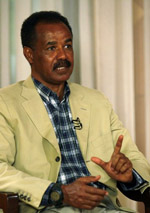Last week, President Isaias Afeworki of Eritrea, Africa’s leading jailer of journalists, discussed press freedom during an extensive interview with Swedish broadcaster TV4. Afeworki, a revered guerrilla commander who led this Red Sea country to nationhood in 1993, banned Eritrea’s budding private media in 2001 and threw journalists in secret prisons without charge or trial. Speaking to Swedish journalist Donald Boström from his palace in the capital, Asmara, Afeworki, at left, took questions on the fate of long-held journalist Dawit Isaac, an Eritrean with Swedish citizenship, and lashed out at critics of the country’s press freedom record.
Isaac and nine other editors of now-banned private newspapers have disappeared in government custody since a brutal 2001crackdown on dissenting voices. Asked which crime Isaac, the one-time co-owner of Eritrea’s once-leading private weekly Setit, had committed, the president declared, “I don’t know.” He went on: “I don’t even care where he is or what he is doing. He did a big mistake.” Afeworki declined to comment on a follow-up question about the nature of the alleged “mistake.”
In a 2004 interview with the Australian Broadcasting Corporation, in response to a question about the late journalist Fesshaye Yohannes, Afeworki said, “I don’t know him.” Yohannes died in prison.
But the president claimed better knowledge of Eritrea’s once-outspoken private press, which he brutally silenced nearly eight years ago. “There were no private media,” he said, adding: “The CIA would finance newspapers, hire journalists, open bank accounts for them outside the country and give them what they have to write in their papers. This is not media.”
What is media in Eritrea today are government-run outlets producing propaganda under tight supervision. Many state media journalists have fled the country citing intense censorship, intimidation or arbitrary imprisonment, and some, like Paulos Kidane have even died while trying. In late 2007, authorities expelled Peter Martell, a foreign correspondent based in Asmara, for refusing to name sources who had expressed disillusionment for the government.
For Afeworki, however, “no one is prevented from freedom of speech.” Authorities even recently published an editorial on the Eritrean government’s Web site called “The Culture of Openness: Unique and Fabulous Eritrean Value.”
The president told his Swedish interviewer: “The fight is always between those who want to control the media and control freedom of speech for their own end and the people at large who would like to have free ways of expression.”
And when asked whether Isaac would be released or taken to court, Afeworki declared: “No, we don’t release him. We don’t take [him] to trial. We know how to deal with him and others like him and we have our own ways of dealing with that.”
You can watch the full interview here.
